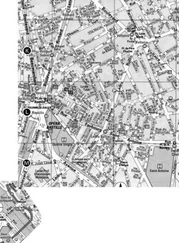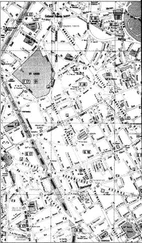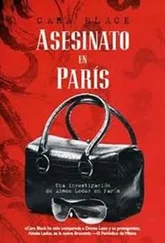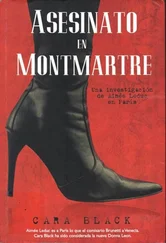An odd look crossed René’s face.
“Are you in pain?” she asked. Or was he afraid to tell her he was leaving?
“You’re my family, René, but I don’t want to stand in your way. I’ll try and talk you out of it, because I’m selfish. But I will respect whatever . . .”
“Did I say anything like that?” René asked.
She shook her head. “But I thought. . . .”
“I’d appreciate a raise when we’re solvent again,” he said, as Aimée bandaged his wrists.
“Consider it done,” she grinned. She took a deep breath.
“At this rate I’m going to have to put your name on the door.”
He looked away but not before she saw a small smile on his face.
“In the meantime, what I can’t figure out is why didn’t they call you again,” René said, “or make more demands.”
Was he trying to change the subject? But he’d made a good point. “True, Regnier was waiting for me to find the jade, or else Gassot.” She stood up. “And I haven’t found either. Not yet.”
She looked out the window to the wet street below. No sign of Regnier or anyone tailing her. The orange-pink neon of Kinshasa Coiffure reflected on the windows opposite. From the resto below, came the beat of the music of Papa Wemba, the King of Congolese Rhumba Rock.
“I have to find out why Olf wants me to monitor the Chinese and British oil bids,” she said. “You’ll have to help me.”
“Oil bids?
René put his feet up on the bed, laid back. His eyes looked heavy.
“And how the jade’s involved with oil. This smelled from the beginning and it’s reeking now.”
But she spoke to a sleeping René.
Friday Morning
“FIND ANYTHING INTERESTING, LARS? ” Aimée asked over the phone. She hoped he’d thaw out and pass on more concrete details about the so-called Circle Line.
“That’s some pudding you’re looking into,” he said, then placed his hand over the phone to muffle some background noise.
“Count on me to stir the lumps in the pudding,” she said.
The sounds of furniture scraping on the floor, then a loud squeak came over the line. “Sorry, we’re moving out the file cabinets. Rumor has it our office has its new coat of paint and they’re shoveling us upstairs. Room 20.”
It was an old signal he used when other ears were listening in. Good thing she hadn’t mentioned Pleyet’s name.
“Can you make some time to have a coffee with me?”
“We’re worked off our feet. Call me next week; we’ll meet at the nice place under the horse chestnuts.”
He rang off.
If she hurried she’d make it to the café on Place Dauphine by the roasted chestnut stand in twenty minutes.
She crossed rue de Rivoli, passed the Louvre’s imposing Cour Carrée, raced down the small street behind the Art Deco Samaritaine department store, and hurried across the Pont Neuf. The wind whipped at her coat but her vision was crystal clear.
Figures in overcoats, bent against the wind, formed a dark stream across the bridge. The words of Hubert Juin’s poem about the Pont Neuf came to her:
I remember those I had no chance to know, the pavement still mumbles . . . the river Seine swirling near the Pont Neuf, Baudelaire slowly goes by, and Verlaine is smiling. Through the sleeping city, passes history.
Shaped like a ship, the back end of île de la Cité held the Jewish Memorial to the Deported. Aimée turned left into place Dauphine, a triangular-shaped tree-lined oasis. Once the orchard of the king, it was surrounded by the two arms of the Seine. Sixteenth century construction of the Pont Neuf had joined the island and several small îlots to the city.
Now, the place Dauphine backed up to the king’s old palace, the present site of the courts of the Palais de Justice and the Conciergerie prison, now a museum, with Marie Antoinette’s cell as stark and damp as she’d left it.
Aimée pushed past the rattan café chairs. She was startled to see Morbier, wearing an old raincoat, under the canvas awning against the wall. He was reading a newspaper. She sucked in her lower lip. Coincidence? She doubted it.
Flics didn’t patronize this place; it attracted residents—such as Simone Signoret and Yves Montand who had lived in the neighborhood and other patrons who could afford the pricey menu. An occasional judge or prosecutor perhaps. But her godfather?
“Right on time,” Morbier said, setting down the paper, keeping the rainhat’s brim lowered over his face. “Another fine mess you’ve got me into.”
“What brings you here, Morbier?” she asked, keeping her tone steady.
“Ask me no questions and I’ll tell you no lies.”
“Mademoiselle?” a waiter asked.
She turned. “An espresso, s’il vous plaît .”
Morbier puffed on a short, fat cigarillo. Clouds of acrid smoke rose.
“Where’s Lars?” she asked him.
“Grow up, Leduc. Time to get out of the sandbox.”
Did he know she’d fallen into one yesterday? Why was he here in place of Lars? A ring of intrigue surrounded her and she still knew nothing.
“You’re old enough to know better,” Morbier went on.
“And young enough to still do it,” she said. “So you’re in league with the Ministry now, Morbier?” She shook her head in disgust. “And you call yourself a socialist?” He might as well take off the socialist party pin in his lapel and grind it in the gravel.
“Leduc, in case you forgot, we have a socialist government. First you drop off this charming woman for me to guard, then use my code to find an address from a phone number,” he said, with irritation. “Now you’re badgering Lars to access security clearance files. Of course, it tripped off an inquiry. Forced us both into some pretty lies.”
This was deep. She felt it in her bones.
“Lars knows the muddy Ministry waters. He navigates well, always has,” she said, reaching for a tissue and wiping beads of rain from her bag. “Inquiry into what?”
“Files requiring special clearance,” he said. “And you know that could mean anything—from the chief’s girlfriend’s flat rental, to his expense account for a lost weekend in Bordeaux.”
Morbier seemed intent on passing this inquiry off as trivial. Was it?
“Since when do you cozy up to Lars?”
Morbier leaned forward. “His old man, your father, and I, were colleagues. Or did you forget that, too?”
Of course she hadn’t; she remembered his famous Sunday pot-au-feu lunches. “It bothers me that a man was shot next to me, died in my arms, and you let his ex-wife leave the country.”
“Murder and thugs near Place de Clichy, druggies disposing of each other! It illustrates the law of natural selection. Those aren’t my problems! Or yours.”
” I remember the thirteen-year-old with tracks on her arm who washed up in your part of the Seine: Then it was your business! You wouldn’t let go of that case.”
“Still can’t,” Morbier said. “Key point, Leduc, my part of the Seine . Clichy’s landlocked. They can keep their trash there. Plenty to go round.”
Compartmentalize. Good flics did that. Kept their minds on the business at hand. Yet, she felt there was a lot he wasn’t saying.
“You got here fast.”
“Group R’s office is next to Lars’s”
“You’ve never told me what your group handles.”
“Need to know basis, Leduc.”
“ Bon. ” She smoothed down her black pencil skirt. Rain pattered on the cobbles. “Pleyet’s name came up as part of the Circle Line surveillance and I saw him at the jade museum. How does it tie together? Well, I’m all ears.”
Silence. Except for the rain pattering on the café awning and the bark of a dog.
Читать дальше











